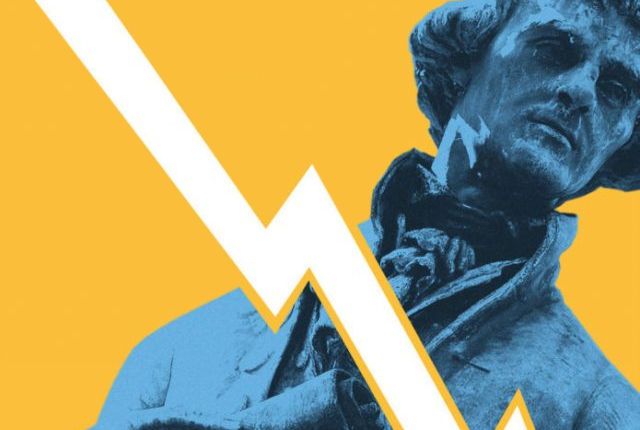Last year, the Obermann Center co-sponsored several events that addressed the future of public higher education. Fellow sponsors were the UI Public Policy Center, Graduate Senate, Graduate and Professional Student Government, Student Government, Faculty Senate, POROI, College of Education, Educational Policy & Leadership Studies, College of Liberal Arts & Sciences, Department of Sociology, Division of Student Life, College of Business, Chief Diversity Office, UI AAUP, and the Iowa City Public Library, with support from Film Scene.
Starving the Beast Film Screening and Discussion
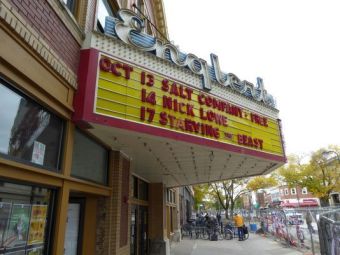 On Monday, October 17, the Obermann Center co-sponsored a free, public screening of the 2016 documentary Starving the Beast: The Battle to Disrupt and Reform America’s Public Universities at the Englert Theatre in downtown Iowa City. The film examines the ongoing power struggle on college campuses and in state legislatures across the nation as political and market-oriented forces push to “disrupt and reform” America’s historic public universities. Focusing on dramas playing out at the University of Wisconsin, University of Virginia, University of North Carolina, Louisiana State University, University of Texas, and Texas A&M, the film documents a philosophical shift that seeks to reframe public higher education as a value proposition to be borne by the beneficiary of a college degree rather than as a public good for society.
On Monday, October 17, the Obermann Center co-sponsored a free, public screening of the 2016 documentary Starving the Beast: The Battle to Disrupt and Reform America’s Public Universities at the Englert Theatre in downtown Iowa City. The film examines the ongoing power struggle on college campuses and in state legislatures across the nation as political and market-oriented forces push to “disrupt and reform” America’s historic public universities. Focusing on dramas playing out at the University of Wisconsin, University of Virginia, University of North Carolina, Louisiana State University, University of Texas, and Texas A&M, the film documents a philosophical shift that seeks to reframe public higher education as a value proposition to be borne by the beneficiary of a college degree rather than as a public good for society.
More than a hundred campus and community members attended the screening, and many stayed for a reception and conversation afterward to consider how the issues raised by the film are affecting the University of Iowa.
Scholar-Activist Sara Goldrick-Rab, Author of Paying the Price
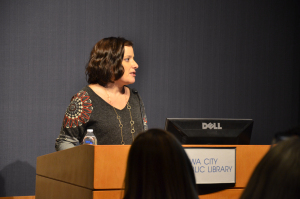 On Monday, February 13, Sara Goldrick-Rab, Professor of Higher Education Policy & Sociology at Temple University, gave two public lectures on the crisis of college affordability and student loan debt.
On Monday, February 13, Sara Goldrick-Rab, Professor of Higher Education Policy & Sociology at Temple University, gave two public lectures on the crisis of college affordability and student loan debt.
The first,“Making College Affordable: Adventures in Scholar-Activism,” discussed ways to use scholar-activism to address social inequality, scholar-activism and professional standards, and scholar-activism in the age of Trump. The talk was part of the UI Public Policy Center’s Inequality Seminar series. Listen to the lecture. (Attendance: 31)
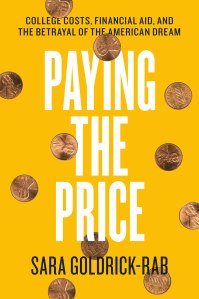 Goldrick-Rab’s second talk,”Paying the Price: College Costs, Financial Aid, and the Betrayal of the American Dream,” took place at the Iowa City Public Library and offered solutions for fixing the U.S. financial aid system to make higher education accessible to all. Both talks drew on research published in her newest book, Paying the Price: College Costs, Financial Aid, and the Betrayal of the American Dream. The book chronicles the experiences of working- and middle-class students who enter public colleges with federal aid and Pell Grants but leave without a degree, unable to afford tuition, books, and living expenses. Watch the lecture. (Attendance: 75)
Goldrick-Rab’s second talk,”Paying the Price: College Costs, Financial Aid, and the Betrayal of the American Dream,” took place at the Iowa City Public Library and offered solutions for fixing the U.S. financial aid system to make higher education accessible to all. Both talks drew on research published in her newest book, Paying the Price: College Costs, Financial Aid, and the Betrayal of the American Dream. The book chronicles the experiences of working- and middle-class students who enter public colleges with federal aid and Pell Grants but leave without a degree, unable to afford tuition, books, and living expenses. Watch the lecture. (Attendance: 75)
Goldrick-Rab, who identifies as a “scholar-activist,” is the Founder of the Wisconsin HOPE Lab, which seeks ways to make college more affordable. Her research examines the efficacy and implications of financial aid policies, welfare reform, transfer practices, and interventions aimed at increasing college enrollment among marginalized groups. She has published articles in The Atlantic, the New York Times, and the Washington Post, was a recent guest on Comedy Central’s The Daily Show, and, in June 2015, joined Senator Elizabeth Warren for a college affordability roundtable at the renowned Albert Shanker Institute.
The Lincoln Project
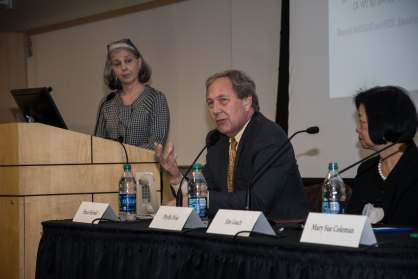
Over the past three years, the Lincoln Project has traveled to campuses across the country to meet with leaders in higher education, government, and business to examine the challenges facing public research universities and begin formulating solutions.
An initiative of the American Academy for Arts and Sciences, the project is particularly focused on current and changing financial models and how that has affected the ability of public universities to meet their educational, research, and public service mission.
In March 2017, University of Iowa President Bruce Harreld and the Office of the Vice President for Research and Economic Development hosted the Lincoln Project. Former UI President Mary Sue Coleman, former Iowa Senator Jim Leach, and former Chancellor of the University of Illinois Urbana-Champaign Phyllis Wise gave a public presentation at the University of Iowa, followed by an invitation-only event in Des Moines with higher education leaders, legislators, philanthropists, and members of the business community. The Iowa City event was moderated by Obermann Director Teresa Mangum.
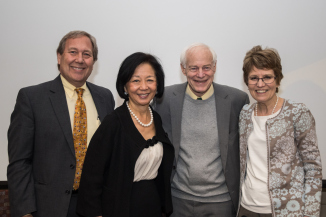
“This project provides opportunities for vital conversations about how we can all support our region’s intellectual infrastructure and advance a robust national research enterprise to position Iowa well in the developing global economy,” UI President Bruce Harreld said in a campus-wide invitation to the UI event. “Through the Lincoln Project, we have the chance to demonstrate that our public universities—which today are often seen as expenses to be minimized—are assets to be leveraged and maximized.”
Attendance: 348
